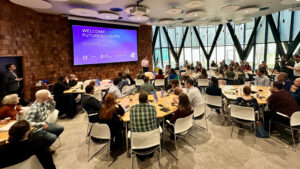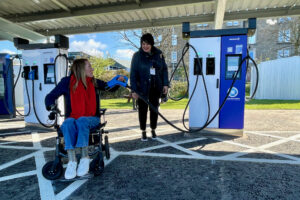

8th May 2023
Celebrating the conclusion of six years of research into rural passenger transport
Innovation in green passenger transport in rural, remote and island regions.
Urban Foresight and a team of international partners are meeting in Orkney today to celebrate the culmination of a six-year research project piloting and exploring green public transport solutions in rural, remote and island regions.
The Green Passenger Transport in Rural Areas (G-PaTRA) project brought together 13 organisations and involved the set up and monitoring of seven ‘Lighthouse Projects’ around the North Sea regions of Europe. The lighthouse projects tested novel innovations in rural contexts: From piloting the use of zero emission busses in rough terrain in Scotland, to developing a business case for a hydrogen ferry in Norway.
The G-PaTRA project was established in 2017 and was co-funded by the Interreg North Sea Region Programme 2014 – 2020, a programme of the European Regional Development Fund of the European Union. The programme focusses on extending overall knowledge and capability through transnational cooperation on pilots, demonstrations and trials.
The original aim was to trial innovations to enhance the capacity of authorities to reduce CO2 emissions of rural transport. The target for each of the lighthouse projects was to demonstrate that a minimum 10% CO2 reduction could be generated from innovative transport interventions in remote, rural and island areas whilst providing the same or better mobility for the residents in question.
With the arrival of the COVID-19 pandemic in 2020, the project’s focus widened to incorporate the changes in demand caused by the pandemic, and consideration of how to meet this in a sustainable way.
Urban Foresight’s role was to capture and assess the innovation from the lighthouse projects and extrapolate the learnings so they could be shared initially within the project consortia, and subsequently documented in a series of public reports.
Our project team are currently enjoying two days in Orkney with the wider consortia at the project’s concluding event, the Key Influencers Summit. This event was designed to share peer-to-peer knowledge gathered from each of the lighthouse projects and discuss these as a wider group. Each partner invited a key influencer from transport to aid the discussion. The learnings distilled from the knowledge sharing workshops will support the development of transport planning, policies, and practices.
Senior Consultant, Rachel Duggan, commented, “The G-PaTRA project represents a best practice example of transnational collaboration, where the similarities and differences of rural dwellers and local, regional, and national transport bodies are now better understood. I hope that the findings will be used in practice going forward. Solutions should incorporate cross-cultural and sectoral learning, addressing climate, mobility, and health challenges.”
G-PaTRA is a project co-funded by the North Sea Programme of the European Regional Development Fund of the European Union.







![cyberessentials_certification mark_colour [12] cyberessentials_certification mark_colour [12]](https://urbanforesight.org/wp-content/uploads/elementor/thumbs/cyberessentials_certification-mark_colour-12-pnvwipr8zh5rhqz25vzzioz2x8t2zltvu0gwqv4000.png)
